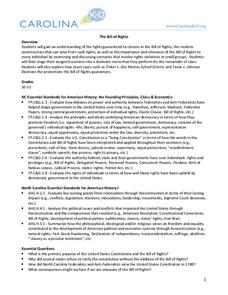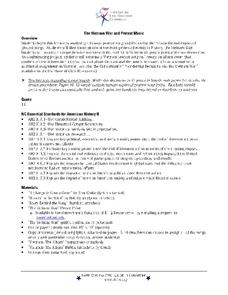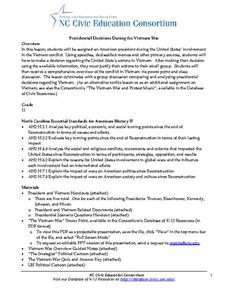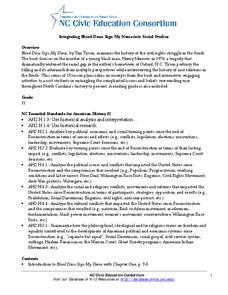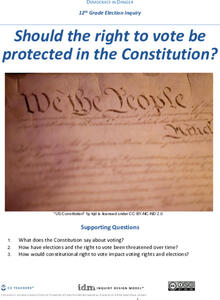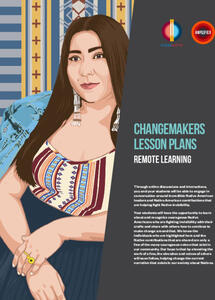Carolina K-12
Causes of the American Revolution
Beginning with the experience of hearing that lockers in school will be taxed, through analysis of political cartoons and informational text, and culminating in a debate between loyalists and patriots, your class members will engage in a...
Carolina K-12
Plessy v. Ferguson & the Roots of Segregation
How far in the past do the roots of Jim Crow and segregation extend? Young historians closely consider this question using detailed PowerPoint slides as a basis for discussion rather than lecture, culminating in an activity where class...
Carolina K-12
What Should President Truman Do?
After reading the article Choices: Truman, Hirohito, and the Atomic Bomb, class members engage in a simulation, assume the role of President Truman or one of his advisors and discuss the options open to the president. The exercise...
Carolina K-12
The Major Conferences of World War II
Young historians create a 1940's news radio broadcast on the five major World War II conferences, including the Atlantic, Casablanca, Tehran, Yalta, and Potsdam.
Center for Literacy and Disability Studies
The Bill of Rights
Explore the Bill of Rights in-depth with this resource packet that includes the complete text of the document, scenarios and discussion questions for each amendment, role-playing activities, exercises, questions for a Socratic seminar, a...
Carolina K-12
The Vietnam War and Protest Music
Here's a must-have resource for your Vietnam War curriculum file. Class members view a PowerPoint that details the background of the conflict and then examines the reasons for and the effects of protest songs on American attitudes toward...
University of North Carolina
The Narrative of the Life of Frederick Douglass, an American Slave
After reading excerpts from Frederick Douglass' autobiography, pupils will draw on what they've learned about the cruelty of slavery to write and present an anti-slavery speech or editorial.
University of North Carolina
Presidential Decisions During the Vietnam War
To begin a study of the Vietnam War, groups assume the role of a US president, examine primary source documents, and based on this limited information, must decide on the United States' actions during the Vietnam War.
University of North Carolina
Integrating Blood Done Sign My Name into Social Studies
Tim Tyson's Blood Done Sign My Name is the anchor text in a unit study of the history of race relations and the civil rights struggle in the South. The 11 lessons are richly detailed, and the unit deserves a space in your curriculum...
National Woman's History Museum
Stacey Abrams: Changing the Trajectory of Protecting People’s Voices and Votes
In this project-based learning lesson, young social scientists investigate Stacey Abrams' campaign to protect the voting rights of people across the nation. Investigators learn how to annotate assigned articles, watch videos, and collect...
National Endowment for the Humanities
In Her Shoes: Lois Weber and the Female Filmmakers Who Shaped Early Hollywood
Lois Weber has been forgotten. So have Dorothy Davenport Reid, Gene Gauntier, and many others. High school sleuths use advanced search engines to investigate these women and discover clues to their disappearance from filmography and...
C3 Teachers
Murder of Emmett Till: Is It Ever Too Late for Justice?
The murder of Emmett Till is the focus of a guided inquiry that asks scholars to research the events, the trial, recent attempts to reopen the case and the effect of the murder on people today.
University of Minnesota
Memory Items
Ready to have an "unforgettable" time in science class? Try a fun and insightful activity, suitable for a wide age group of learners. Explore how human memory works when pupils try to remember objects they've seen before comparing the...
C3 Teachers
Democracy in Danger: Should the Right to Vote Be Protected in the Constitution?
High school seniors investigate what national, state and local rules say about voting. After examining the Constitution's articles, clauses, and amendments, researchers look at videos, listen to podcasts, and read articles to gather...
C3 Teachers
Black Women Writers: What Gets Black Women Heard?
Zora Neal Hurston, Toni Morrison, and Maya Angelou are featured in a guided inquiry unit. High schoolers research the lives and works of these and other Black women writers and craft an argument, using evidence from their research, to...
C3 Teachers
2020 Protests: Is There Anything New about the 2020 Protests?
Are marches and protests an effective form of resistance? That is the question high schoolers seek to answer in this inquiry lesson as they compare the 2020 protests to historical ones. Researchers use Venn Diagrams to compare images...
Curated OER
Changemakers Lesson Plans
Teens and tweens are invited to become changemakers in a five-lesson unit, asking them to investigate and share what they have learned about exemplary, contemporary Native Americans. They gather facts about their research subject, record...
Anti-Defamation League
8 Ideas for Teaching National Hispanic Heritage Month
Here are eight ideas to celebrate National Hispanic Month! Scholars have the opportunity to read and discuss literature, include people and events in history, examine art, watch and discuss films, listen to and dance to music, explore...
Carolina K-12
Doing Democracy
How do you explain democracy to a middle school classroom? A social studies resource breaks elections and the democratic process down for your class. Discussion questions, worksheets, activities that build critical thinking skills, and a...
Carolina K-12
Public Christmas Displays and Lynch v. Donnelly
Does a Christmas display on government property violate the Constitution? Learners study the Establishment Clause of the First Amendment and learn about the landmark Supreme Court case Lynch v. Donnelly through watching a documentary and...
Project Tahoe
Individual Rights vs. The Greater Good Within the Scope of War
When, if ever, is the government justified in restricting individual rights? When, if ever, should the "greater good" trump individual rights? To prepare to discuss this hot-button topic, class members examine primary source documents,...
Albert Shanker Institute
Heart of the Matter
Most people have heard of Dr. Martin Luther King, Jr. and his famous "I Have a Dream" speech, but few have heard of Philip Randolph and Bayard Rustin. Who were these guys and what did they have to do with this famous landmark event in...
Academy of American Poets
Women in Poetry
Imagine linking poetry to technology! Thirty-three lessons comprise a 6-week "Women in Poetry" unit for high schoolers. Class members research women poets, learn how to respond electronically to discussions, write their poems, create web...
K20 LEARN
Watch Your Tone: Tone Analysis Through Music And Nonfiction
Identifying the tone of a piece of writing or the author's attitude toward the subject matter can be difficult for learners. Simplify the process with a lesson that begins with skits, moves to songs and their lyrics, and then to passages...






